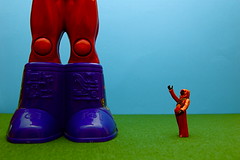Here’s the good news about killer robots: Despite their near ubiquity in science fiction, they aren’t inevitable.Read the whole thing. I'm a fan of genre conventions, mostly because they promote readerly enjoyment and clear composition. It's easier to have fun when both authors and audiences have an idea of where things are headed. But I'll readily admit that tropes can quickly become ossified. The evil corporation tries to squash the cyberpunks. Religious characters are ineffectual, hypocritical, or insane. The military performs clandestine experiments on a supersoldier who goes rogue. Sound familiar? Writers often fail to consider the thematic implications of such old standards and simply roll with them because they've accreted a kind of compositional orthodoxy. But as Mims points out, these tropes can prove problematic with more than just a story's message: They can clash with verisimilitude. The only way to avoid it seems to be solid research married to a measure of imagination.
The bad news is that stopping them is going to be much harder than simply banning government-sponsored research on them, as frequently proposed by technologists and nongovernmental organizations. Understanding why tells us a great deal about the massive impact that robotics and automation will have on every part of the 21st century. ...
Imagine the following scenario: It’s 2025, and self-driving cars are widely available. Turning such a vehicle into a bomb isn’t much harder than it is to accomplish the same thing with a conventional vehicle today. And the same goes for drones of every scale and description.
It’s inevitable, say the experts I talked to, that nonstate actors and rogue states will create killer robots once the underpinnings of this technology become cheap and accessible, thanks to its commercial use.
“I look back 10 years, and who would have thought people would be using cellphone technology to detonate IEDs?” says retired Rear Admiral Matthew Klunder, who as chief of research spent four years heading up the Navy’s work on autonomous systems.
(Picture: CC 2010 by JD Hancock)



No comments:
Post a Comment